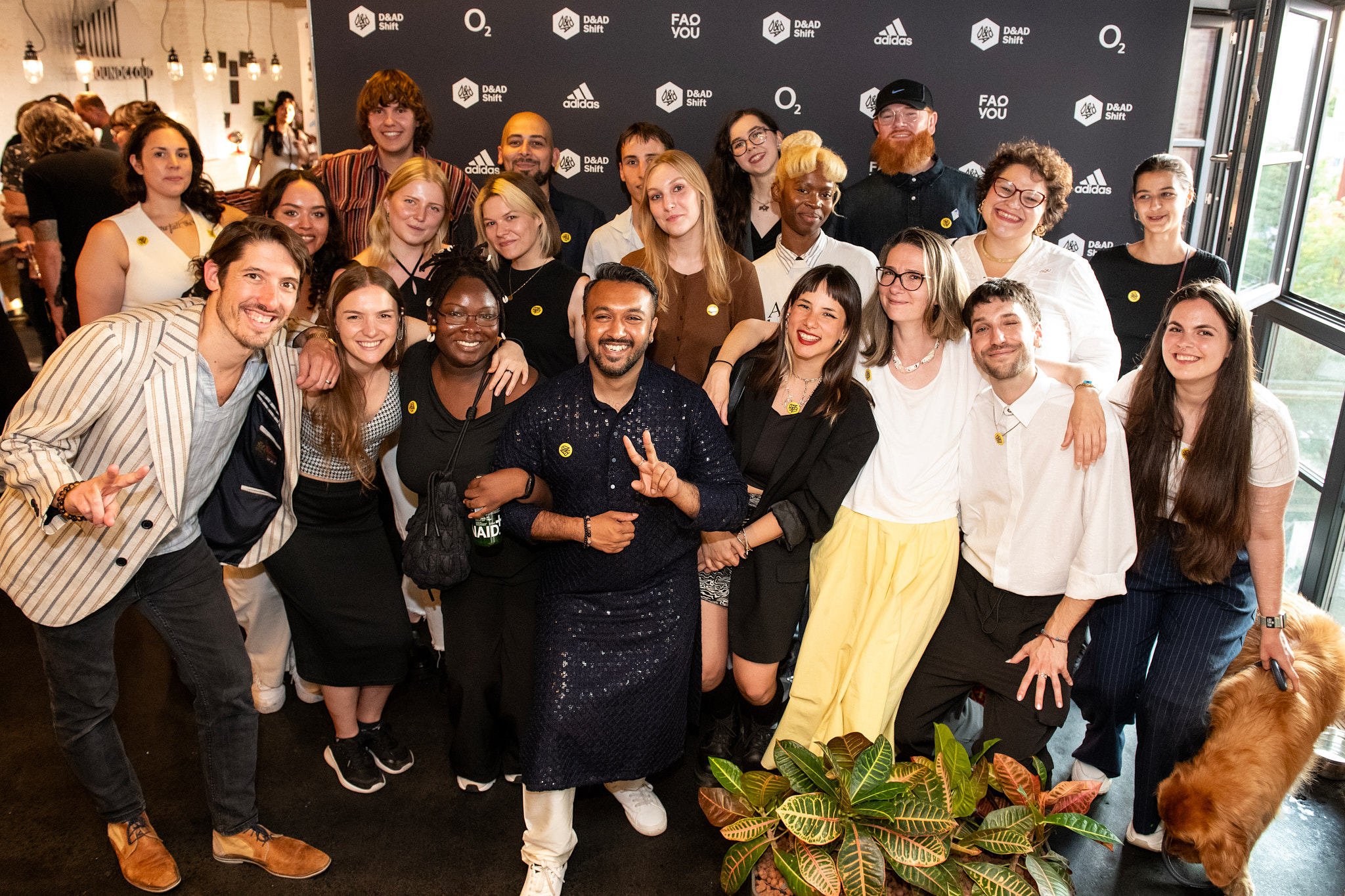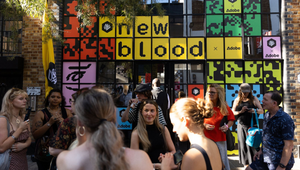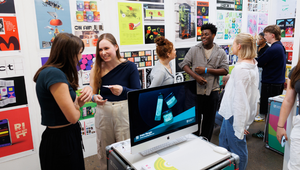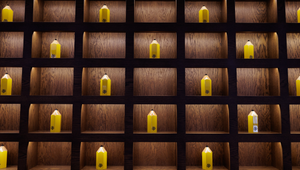
D&AD Shift Germany: Empowering Creatives to Break Into the Industry

D&AD Shift has expanded its groundbreaking night school programme to Germany, supporting self-taught creatives break into the industry.
Sara Pintado, senior programme manager, shares her insight on what sets Shift apart, its impact on emerging talent, and how the initiative is tailored to meet the unique needs of Germany's creative community.
She speaks to LBB’s Olivia Atkins about real-life briefs, hybrid learning and mentorship, as well as how Shift is cultivating a new generation of diverse creative professionals.

LBB> What motivated D&AD to launch the Shift programme in Germany, and how does it differ from similar initiatives in other countries?
Sara> D&AD Shift is a free, industry-led night school to help self-taught creatives enter the industry from outside traditional pathways. Shift’s approach aims to shake up old industry paradigms to benefit self-taught creative talent, creating a fresh system for talent to both access and flourish in the commercial creative industry. Shift runs in five cities globally: Berlin, London, New York, Sydney and São Paulo.
Each city’s needs are unique. We are interested in the discrepancy between the people of that city and the industry that is creating for those people. Shift aims to redress this balance. In Germany, despite the strong young creative community that exists, our research showed the lack of racial and gender diversity in the workforce. While Germany's education system provides access to degrees through free public universities and apprenticeship programmes, the lack of awareness about the creative industry as a viable career option for underrepresented groups remains a barrier.
From a curriculum perspective, when launching Shift in any city we also consider what kind of skills creative recruiters are looking for in their local talent. For example, in São Paulo we had a bigger focus on the Creators Economy as it is the second-largest market of content creators.
LBB> Can you describe the selection process for the Class of 2024? What qualities and skills were you specifically looking for in the applicants?
Sara> Across all five global programmes, we follow the same criteria. We assess applicants based on their creative potential, looking at their work and creative thinking, which doesn't need to be a polished portfolio but should demonstrate their capabilities. We also consider the unique challenges of different communities in each location. Additionally, we evaluate whether applicants' goals align with what our programme offers. We seek candidates who are committed, resilient, empathetic, and team players, with essential skills in creative thinking and communication.

LBB> The programme includes a mix of online and in-person learning. How do these different formats complement each other in providing a comprehensive educational experience for the Shifters?
Sara> The programme is run from Berlin, but its hybrid learning set up aims to enable access to creatives in other locations in Germany to balance their day jobs with their learning. We also prepare Shifters to work in both digital and physical environments, ensuring they are ready for the real world of work. The in-person sessions foster connection, allowing them to bond as a team and socialise beyond the screen, while also offering opportunities to connect with the industry face-to-face. Experiential learning is emphasised through visits to agencies and brands, giving the Shifters a 360-degree experience of what their daily work life might entail. Additionally, we cater to various learning styles and personalities to bring out the best in each Shifter.
LBB> Working on real-life creative briefs from brands like O2 and adidas is a core part of the programme. Can you share some insights into how these collaborations were structured and the impact they had on the Shifters' learning experience?
Sara> During Shift, each cohort tackles three briefs from global brands, all based on real business challenges. Two of these briefs are completed during the programme, while the "Brief in a Day" is a high-energy experience where Shifters receive the brief, brainstorm, develop ideas, and present to the client all within a single day.
In Germany, for each brief, we put three to four Shifters in a group together, where they were responsible for working with one another to ideate and come up with a solution for the client.
One important part of what we offer in the programme are the programme ECDs: these are typically two or three senior or executive-level people from the industry who play the role of executive creative director for the briefs. During the course of the briefs, the Shifters are responsible for reporting their progress to the ECDs, who in turn provide their feedback in an open session format. This dynamic really helped the groups to develop their ideas and refine the finished product.
The groups presented in front of each other, there was no secrecy about the pitches – like there might be in a competitive setting in an agency. It was great to see how Shifters supported each other’s ideas, and were also able to refine their work based on the input of their peers.
Responding to creative briefs is a cornerstone of what the Shifters produce during the programme, as well as what they get out of it. These briefs go into their portfolios, but it’s also a requirement for them as part of finishing the programme. It’s an opportunity for the Shifters to use what they’ve learned from the industry through all of their sessions while putting their creative skills into practice.
LBB> Mentorship is a significant component of D&AD Shift. How do you match Shifters with mentors, and what kind of guidance do mentors provide throughout the programme?
Sara> Mentoring is not just about guiding Shifters on their journey; it's also a valuable opportunity for personal and professional growth. Our mentoring programme benefits both our Shifters and our mentors. For mentors, it fosters self-awareness and hones leadership skills, while also bringing new perspectives and fresh ideas to a traditionally conservative industry. An industry mentor provides guidance on the challenges Shifters may encounter throughout the programme, such as building portfolios, handling brief work, securing their first job, and expanding their professional network.
Additionally, each Shifter is paired with an alumni mentor who assists them from the start of the programme, helping them navigate their Shift experience and offering advice on how to take the first steps in their career.

Above: Peter Mate.
LBB> The final showcase is a major milestone for the Shifters. What are some of the standout projects or presentations from the Class of 2024 that demonstrate the programme's success in nurturing creative talent?
Sara> Honestly, it’s hard to know where to start! The talent in this year’s Shift Germany class was off the charts, and what they produced in their briefs was truly impressive. We consistently received feedback from a number of teachers, mentors and brief partners, as well as the ECDs themselves, about how impressed they were with the level of quality that came out of this year’s cohort.
What came across was how professional all of their work already was despite many of the Shifters not having that much work experience yet as professional creatives. Another thing that stood out was how fluent this group was with AI. We incorporated a few sessions on AI and creativity into the programme, but they already know a lot going in, and a few individual Shifters in particular were really good at integrating AI into their creative process.
With all of this said, maybe the most impressive thing to consistently come out of this group was to see what they were able to do creatively with only a little bit of time to work. The whole Shift programme is compressed, and it’s already amazing to see what comes out of each briefing group in only a few weeks or in the case of Brief in a Day, only a few hours.
The quality of this work points to the creative potential that this group has had from the beginning, powered further by the new skills and confidence they’re now taking with them into the creative industry after completing Shift.
LBB> Looking ahead, what are the plans for D&AD Shift in Germany? Are there any new elements or expansions planned for the programme to further support self-taught creatives?
Sara> Shift has received a fantastic reception in Germany over the past two years. However, its future depends on continued support from the local industry and the ability to raise the necessary funding to make it happen again. Shift is by and for the local community. We rely on the generosity of our industry teachers, mentors, and sponsors to fund and inform the night school. D&AD encourages local brand and agency leaders to keep supporting Shift so we can continue to support the German talent we need to do even better, more inclusive, more effective design and advertising.
Shift runs in five cities globally. If you'd like to be part of Shift in Germany or any other city as a sponsor, teacher or mentor, please register your interest and they'll get back to you.
If you are based in Sydney and are looking for the best talent, you're invited to join D&AD and celebrate its Shift Sydney Showcase on September 12th at 6pm. Click here for more information and registration.















